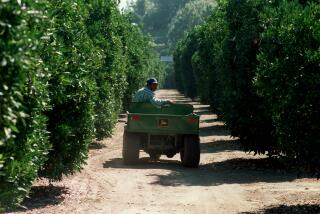Sunkist Expects Record Sales in ’85 : Citrus Growers $45 Million Ahead of Year-Ago Level
- Share via
Sunkist’s 5,000 citrus growers in California and Arizona will likely achieve record sales and returns this year, the cooperative’s president reported Tuesday.
Sales at the end of June--two-thirds through the crop year--totaled $45 million more than at the same time last year, President Russell L. Hanlin told a Camarillo gathering of Sunkist’s Ventura County members.
“While most of American agriculture is in alarming decline, our citrus industry is solid, and the growers are making a little money,” Hanlin said in an interview. Sunkist Growers has “turned the corner” since 1983’s bumper crop depressed prices and sent sales plunging to $644 million from $700 million in 1982. Last year, however, sales rebounded to $748 million, and Hanlin predicted that they would be “around the $800-million level” this year.
“Our citrus industry has entered a period of general economic stability,” Hanlin told the growers.
In addition, freezing weather that devastated citrus groves in Texas and Florida and the outbreak of citrus canker in Florida sharply reduced the amount of fruit for processing, reducing inventories swollen since 1983.
Production Cuts
In addition, 1983’s experience led California and Arizona growers to cut back on production acreage “to the point that we now have a rather good balance between supply and demand for all varieties,” he said.
About 90% of Florida’s citrus crop goes into processing, while most of the Sunkist crop--65%--goes to the fresh-fruit market, so the two regions’ production tends to be complementary rather than competitive, Hanlin said.
Also aiding stability is growth in exports--mostly to Pacific Rim nations--which now account for about 30% of Sunkist’s fresh-fruit sales and are expanding, Hanlin said. Japan is the major customer, followed by Hong Kong, Singapore and Malaysia. Australia, New Zealand, Taiwan and Korea are additional export markets offering room for expansion, he said.
Hanlin hailed the appointment last June of Arizona citrus grower John Norton as deputy secretary of the U.S. Department of Agriculture for ensuring continuation of the marketing orders that enable growers to regulate the flow of their crop to market. The orders governing navel and Valencia oranges have been strongly criticized by a minority of independent growers and some “blind deregulators” in the federal government, he said, but a greater recognition now exists of their value in assuring a steady flow of fresh fruit.
More to Read
Inside the business of entertainment
The Wide Shot brings you news, analysis and insights on everything from streaming wars to production — and what it all means for the future.
You may occasionally receive promotional content from the Los Angeles Times.










